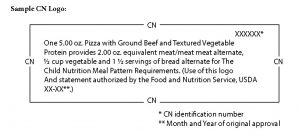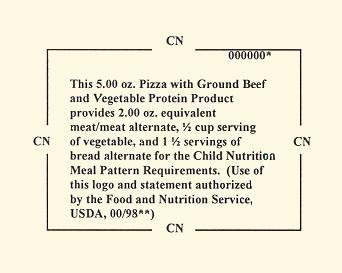A Look At CN Label Guidance
Centers and Day Care Homes offering meals through the Child and Adult Care Food Program (CACFP) play a critical role in supporting the wellness, health, and development of children, older adults, and individuals with disabilities through the provision of nutritious foods. In particular, child care providers have a powerful opportunity to instill healthy habits in young children that serve as a foundation for healthy choices in life.
https://www.fns.usda.gov/cacfp/meals-and-snacks
What is a CN label?
A CN label indicates that the product has been approved to be served in your child care home. These products are commonly bulk-packed and are available from food service agencies. Occasionally, CN label products are available at whole sale club stores such as Costco and Sam’s club. One example of a Product Formulation Sheet version of a CN label can be found at http://www.cnputah.org/resources/linked/miscellaneous_product_information.pdf
Manufacturers want to provide Child Nutrition (CN) Labels because they
- Are a voluntary component of the Federal labeling program for the Child Nutrition Programs.
- Provide a warranty for CN-labeled products for auditing purposes if the product is used according to manufacturer’s directions as printed on the approved CN label.
- Allow manufacturers to state a product’s contribution to the meal pattern requirements on their labels.
What products are eligible for CN labels?
Main dish products that contribute at least ½ ounce to the meat/meat alternate component of the meal pattern requirements. Examples include, but are not limited to, beef patties, cheese or meat pizzas, meat or cheese and bean burritos, egg rolls, breaded fish, and chicken portions.
Juice and juice products containing at least 50% full-strength juice by volume. This includes such products as frozen juice drink bars and sherbet. 100% juice products are NOT eligible for a CN label. Since 100% juice credits 1 fluid ounce per 1 fluid ounce, there is no need for a CN label.
How to identify a CN label:
A CN label will always contain the following information:
- The CN logo, which is a distinct border.
- The meal pattern contribution statement.
- A unique six-digit product identification number (assigned by the USDA Agricultural Marketing Service) appearing in the upper right hand corner of the CN logo.
- The USDA/FNS authorization statement.
- The month and year of the original FNS Final Approval appearing at the end of the authorization statement.
- The remaining required label features: product name, inspection legend, ingredient statement, manufacturer’s name, signature/address line and net weight.
Sample CN Label logo:
Note: The CN number on the following sample label is not an actual CN number. A valid CN label will never have XXXXXX as a CN number.

For any CN-labeled product to be valid, the purchased product label must have the CN logo on it. A company may have a legitimate CN label approval, but unless the product is produced under inspection following all CN requirements and the CN logo is part of the printed label on the purchased product, it is not a CN-labeled product and is not warranted by USDA. A valid CN logo will never be a separate sticker. Printing a fact sheet or manufacturer’s statement from a website does not document that the CN-labeled product was purchased. In addition, a fact sheet or other manufacturer documentation is never authorized to have the CN logo on it. Proper documentation of a CN-labeled product is an actual label on the purchased product carton.
For a detailed explanation of CN labeling Regulations for the CACFP, see 7 CFR Part 226, Appendix C or the FBG for CN programs, Appendix C. Program information is also available online at: http://www.fns.usda.gov/cnlabeling/child-nutrition-cn-labeling-program
More CN Label Guidance and Information:
What are the advantages of using CN labels?
A CN label statement clearly identifies the contribution of a product toward the meal pattern requirements. It protects a school from exaggerated claims about a product.
A CN label provides a warranty against audit claims, if used according to the manufacturer’s directions.
Are CN labeled products more nutritious than similar non-CN labeled products?
No. While a CN-labeled product is guaranteed to contain a certain quantity of food, it does not indicate that the quality of the food is any different than a non CN-labeled food. Neither does it mean the foods are safer to eat or free of pathogens or allergens.
https://www.fns.usda.gov/cnlabeling/fns-meal-programs
Do CN labeled products cost more?
Costs should be similar. Cost comparison between two meat products should be based on the cost per ounce (or pound) that contributes to the meal pattern requirements, not on the product cost per ounce (or pound). Please refer to the Notice to the Trade: Fee for Child Nutrition Labeling Review and Approvals and the Memorandum of Understanding for information regarding program fees.
How do I identify a CN label?
In addition to required labeling features, a CN label will always contain the following:
The CN logo (which is a distinct border) The meal pattern contribution statement
A 6-digit product identification number 
USDA/FNS authorization statement
The month and year of approval.
CN Label sample
Sample label statement:
The six digit CN identification number in the upper-right corner is assigned by the AMS-CN Labeling Program Operations Office.
If you are using a product that required a CN label YOU MUST KEEP A COPY ON FILE. They may be kept in a notebook, file folder, electronic file; ready to provide to monitors.
When re-purchasing a product it must be the exact product, weight, labeling, etc. or a different product with a CN label.
The following products MUST have a CN Label or product formulation statement in order to be creditable:
Bacon, Turkey
Bologna (free of by-products/extenders)
Canned or Frozen foods: Stews, Beef-a-roni, Chili Macaroni,
Pizza
Chicken Nuggets
Liverwurst
Luncheon Meats
Meat Sauce
Meat Stick—Pepperoni stick
Pot Pies (commercial)
Raviolis
Polish Sausage
Salami
Sausage (other than fresh)

